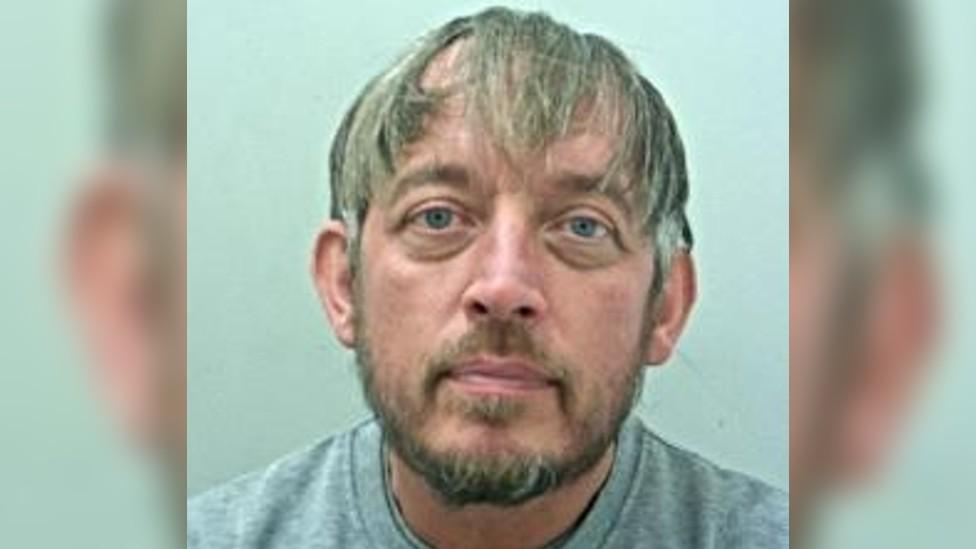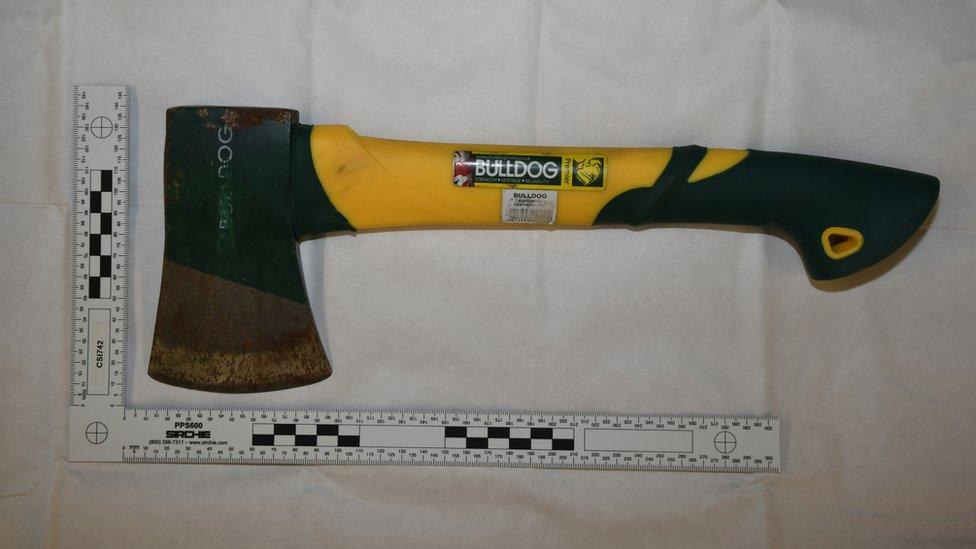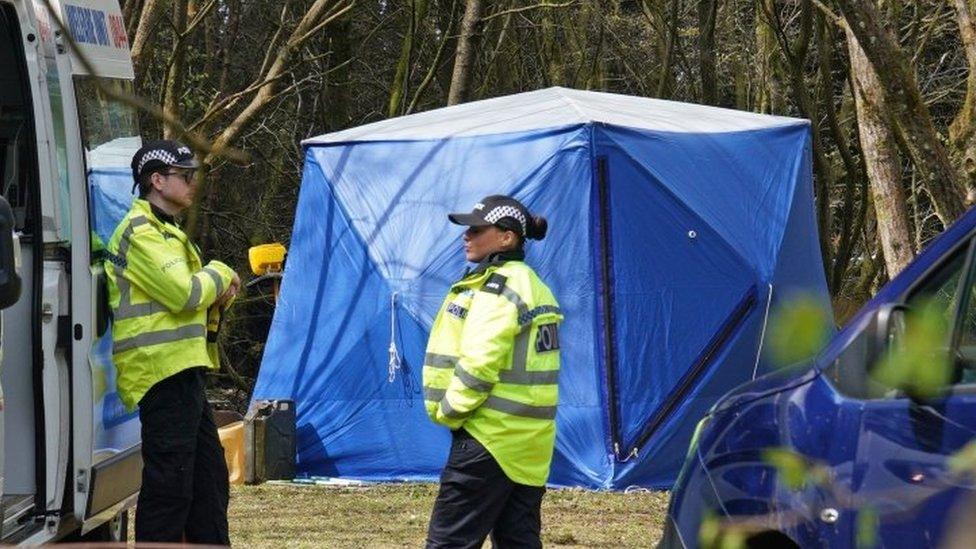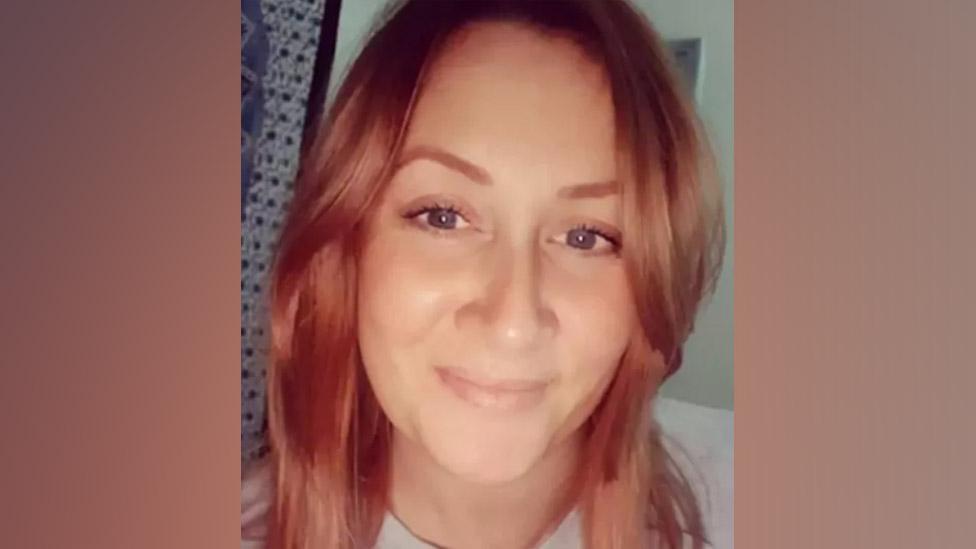Katie Kenyon murder: Man who said axe death was accident jailed
- Published

The mother-of-two's body was discovered by police on 29 April
A "deceitful bully" who had claimed he accidentally killed his ex-girlfriend when he threw an axe has been jailed.
Andrew Burfield admitted Katie Kenyon's murder on 22 April on the third day of his trial at Preston Crown Court.
Ms Kenyon's sister told Preston Crown Court the mother-of-two, who was hit 12 times to the head, had tried to stop him doing "what he did to her to other women" and it "cost her her life".
The 51-year-old was jailed for life with a minimum term of 32 years.
Speaking after sentencing, Det Ch Insp Al Davies said Burfield, of Todmorden Road, Burnley, was a "wicked, deceitful bully who sought to isolate Katie from her family so he could control and manipulate her".
"He first sent bailiffs to her house, revelling in the distress that it caused her [and] then sought to rekindle the relationship, all to lure Katie to the woods where he would murder her in the most heinous of circumstances," he said.
In a statement which she read to the court, Sarah Kenyon-Holden said her sister told her family that "she wanted to stop Andrew Burfield from being able to do what he did to her to other women".
"She wanted to stop him. She wanted answers. This cost her her life."
'Completely implausible'
At the opening of the case on Monday, the court was told Burfield was arrested following the 33-year-old's disappearance and interviewed four times, initially denying any knowledge of her whereabouts.
However, David McLachlan KC, prosecuting, said that in Burfield's penultimate interview, there was a "revelation" and his version of events changed.
He told police he had taken Ms Kenyon to Gisburn Forest in the Forest of Bowland for a picnic and she had "bet" him he could not hit a drink can with an axe that he was using to chop wood.
"I went for the tree at the side of her and it hit her in the head," he told officers.

Burfield used Ms Kenyon's phone to send messages to her children and to himself after her death
He went on to claim that she had been hit with the back of the axe and she had no other injuries, but the court heard a post-mortem examination showed she was struck an estimated 12 times in the head with the weapon.
Mr McLachlan said forensic pathologist Dr Jamie Robinson had considered Ms Kenyon's injuries and found Burfield's claim to be "completely implausible".
The jury was told that on 21 April, Burfield travelled to Gisburn Forest with a set of ladders and spade he had borrowed from his parents.
He then went back to the location the following day with Ms Kenyon, travelling in his Ford Transit van and stopping off at McDonald's on the way.
He spent just over 42 minutes in the forest, where he killed her and buried her body, and then, in the hours after, he used Ms Kenyon's phone to send messages, drafted the month before her death, to her children and to himself.
He also messaged the phone from his own mobile to leave a voice note that said he was "a bit worried" about her.
'Week of torture'
Lancashire Police said Ms Kenyon's family quickly became suspicious of the messages, as they included spelling errors such as a mistake in the name of her dog, and alerted officers.
The force said Burfield had also called police to his home on the day he murdered Ms Kenyon, claiming he was being threatened and a man was trying to force his way into the house.
Officers returned the following day and noticed a fire in his log burner.
Detectives later discovered he had put Ms Kenyon's phone in the fire.

A post-mortem examination showed Ms Kenyon was struck an estimated 12 times with an axe
The force said two days after the murder, a woman who Burfield had done building work for contacted officers, who searched a wheelie bin at her property and found blood-soaked bags containing the flip flops Ms Kenyon had been wearing.
The bags also contained documents with Burfield's name and address on them.
Police later recovered an axe and a spade from his cellar and forensics tests confirmed that Ms Kenyon's blood was on the weapon.
The force's seven-day search for Ms Kenyon, which her sister told the court was a "full week of torture" for her family, ended with the discovery of her body by officers on 29 April.
A search of the burial site revealed two different footmarks that proved Burfield had been there twice and a speck of Ms Kenyon's blood was later found in the seal of his washing machine from his attempt to clean the clothes he had been wearing during the murder.
'Dangerous monster'
Sentencing Burfield, who changed his plea to guilty on the third day of his trial, Mr Justice Goose said he had told Ms Kenyon he would take her to therapy on 22 April, but instead he planned to kill her.
He said it had been "a ferocious and cruel attack", which had been followed by Burfield "calmly" placing her in the grave and covering her body.

Katie Kenyon's body was found in the Forest of Bowland
Addressing Burfield directly, the judge said he was "satisfied you were manipulative and controlling" while Ms Kenyon was "vulnerable", adding: "She looked to you for love and support; in return, you planned to carry out her murder."
He added that Burfield's change of plea to guilty was "a final recognition your game plan had failed".
Tim Storrie KC, defending, said "that to no degree" did Burfield "avoid responsibility for what he did and for the turmoil he has wreaked on Katie Kenyon and the community in which she lived".
Speaking after the hearing, Mr Davies said Burfield was a "dangerous monster" who had tried to control Ms Kenyon.
"When it became clear that she was no longer seduced by his fanciful lies, he set himself on an abhorrent course of conduct which would eventually lead to the pre-planned murder of a kind, loving mother-of-two," he said.
Senior crown prosecutor Tom Snape added that Burfield carried out a "premeditated, brutal attack on Katie Kenyon" and had gone to "great lengths to try to cover his tracks".

Why not follow BBC North West on Facebook, external, Twitter, external and Instagram, external? You can also send story ideas to northwest.newsonline@bbc.co.uk
- Published16 November 2022

- Published14 November 2022
